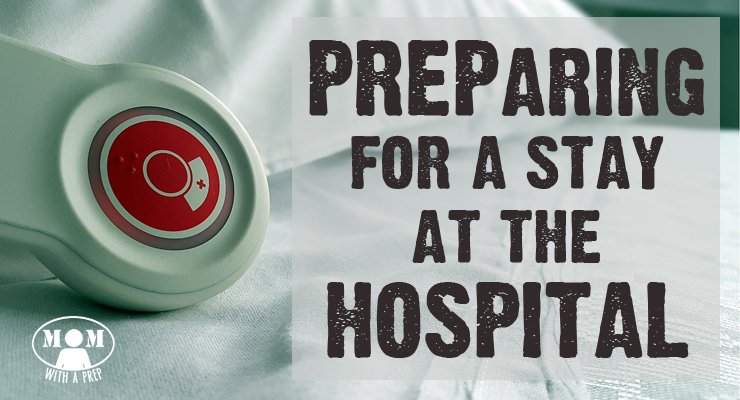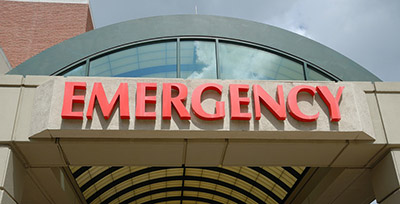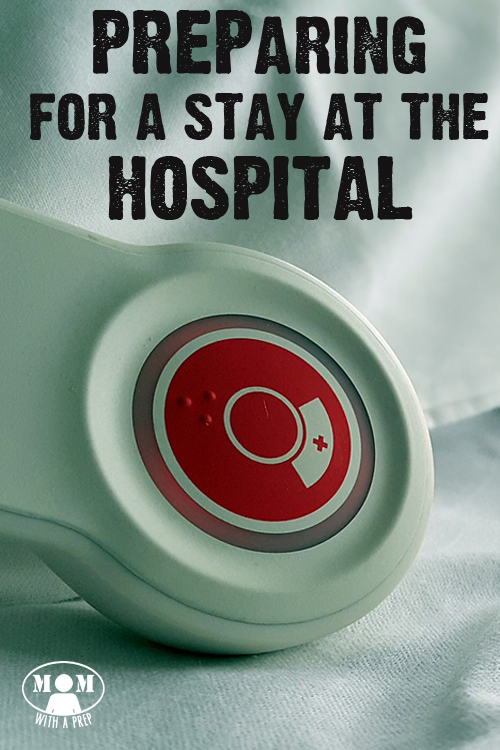Even at your most vulnerable, you can be PREPared before, during and after a hospital stay. You may not be able to bring your emergency kits and all of your preparedness items, but you can do your best to be as prepared as possible. I’ll give you tips below:

Not long ago, I found myself being admitted into the hospital for an emergency situation. It wasn’t something I had planned for or wanted, but it happened. And while we were able to grab bags for the kids to sit in the ER waiting room and be occupied and sleep if they wanted, we were wholly unPREPared for me staying. I was admitted for a few days and tested for all sorts of really scary sounding things (thankfully, it didn’t turn out to be so bad), and there were things I wish I’d had with me in the beginning to help me feel better.
Before we continue, let me say that I’m not a medical professional, I don’t play one on television or the movies, and anything I suggest needs to be weighed against the medical advice of your doctors, nurses and the circumstances you find yourself in. But these tips can get you thinking about what will help you in your particular situation. I also realize that many times, our hospital visits are emergency endeavors, and we can’t prep a bag to go with us, nor is it a bag you want to add to the list of bags you already might be using.
However, if you frequent the hospital, you probably already have a list going or a bag with particulars that you can add to. If you don’t, keep these ideas in mind.
How to PREPare yourself for a Hospital Stay Before & After
BEFORE
- Have a contact person who can get to you (with a key) if you have to be home alone during your stay after.
- Stop your mail or have someone pick it up for you.
- Have someone to help with pets or board them.
- Have a meal plan set up on how to feed yourself and your family once you come home. You may be confined to bed, on limited mobility orders, etc. Having food purchased and arranged beforehand will help your spouse manage things without you, or will give you some peace of mind if you have to be home alone upon your return.
- Get your bed changed
- Arrange your furnishings and belongings to accomodate the recuperation plan you’ll have when you return home.
- Have an advance directive – a Living Will already prepared can be so helpful in the case of an emergency at the hospital if things don’t go exactly as you’d hoped. It can help ensure that your wishes are carried out and make decision-making easier for your family.
- Get your papers together, including insurance card, if possible. You should always have your insurance card in your wallet for emergencies.
AFTER
- Follow your doctor’s advice on recuperation. If they say rest, rest. If they give you restrictions on what you can do, do it. It will probably help your recovery tremendously.
- Keep in contact with someone daily so that they can check on you if you have to be alone.
- Keep your follow-up appointments. I know they will feel lame, but it’s important to make sure that your recovery is on track.
What to Take to Make Your Hospital Stay more Comfortable
Of course, all this is a mute point if you are admitted on an emergency basis, but if you have a friend or family member who can pick up these items from your home and bring them to you – all the better.
Personal Items
- Extra clothing – you may hate hospital gowns, and if your condition doesn’t require you being in one (ready access to your body for testing or cleaning), then by all means, wear those clothes that make you comfortable!
- Socks – you’ll want socks to keep your feet warm if you tend to get cold feet. If you’re hospital was like mine, they may prefer you wear the socks they provide with the grippy soles. But have some of yours in case you’re more comfortable.
- Shoes – I don’t want to walk around a hospital and then put those feet into my bed.
- Sanitary needs – whether you are menstruating or have other personal sanitary needs, bring your own, because chances are, what is provided by the hospital may not be what can comfort you.
- Your own pillow – It will make sleeping so much nice to do it on your own pillow rather than the hospitals. I know my hospitals pillows were useless for much of anything. You’ll want to cover it in a couple of layers of pillow cases and wash them well when you get home.
- Ear plugs – whether you’re sharing the room or not, hospitals are noisy places. I stayed across the hall from the supply closet and let me tell you – it was so noisy. Between staff standing outside of it and gossiping (Hello, it’s 3AM and we’re trying to sleep!) to the door constantly being opened and slammed, there wasn’t much sleep to be had. Ear plugs would’ve definitley helped!
- Bible – or other book of faith for those who need it. You may or may not find a copy in a side drawer
- Books & music– whether reading or puzzle, something to help keep your mind off of your circumstances and help pass the time is better than staring at the television. I have my tablet handy for times I get stuck and can listen to music I’ve loaded on it, or read books on my Kindle app. It’s one that I don’t mind if it is broken or stolen as it’s an old version. Just remember that even in a hospital, theft can be an issue so don’t keep something there that you won’t mind if you lose it somehow. If you don’t bring one, the volunteer staff will have access to things you might enjoy.
- Hygiene items – while most hospitals provide items necessary for most personal hygiene, having your own stuff can help you feel so much better.
• READ MORE: How to read preparedness and homesteading books for free.
PREParedness Items
I’m going to preface this section with this: Sometimes you’ll be without your Everyday Carry Items or your emergency and you’re just going to have to be okay with that. Sure, you’ll want to make sure you’ve noted the family snack room, where they keep general first aid for a floor, etc., in case something awful happens while you’re there, but you are in the hospital to be treated and heal. Concentrate on that first.
In my case, the next day, my husband brought a small, non descript backpack full of needs for me, just in case. This was basically my Mom Bag thrown into a backpack instead. But I can tell you, it was the furthest thing from my mind that day. I am glad I had it because a few things became useful, but don’t spend more time fretting about your go-bag than you do about your health and what’s happening to you at the moment.
I found a few of the items most helpful while I was there, but for the most part, didn’t use anything. But it was there with me to give me a little comfort.
What I found helpful:
- Flashlight – I kept mine on the tray table and ended up using it once during the night when I couldn’t find something I’d dropped.
- Clippers – nothing like having a hangnail that catches on the blanket constantly and not being able to do anything about it!
- My Tablet – as stated above, I keep tablet in my day bag for just such a time as this. While I can read and listen to my music on my phone, I prefer the Kindle for longer reading time.
- Shoes – while I don’t carry them in my bag, having a pair of shoes handy that you can walk out with is good. Not only will you get to go home at some point, the what-ifs of evacuation keep me with shoes around all the time. While those brown grippy socks may be good for walking to the bathroom and back, they aren’t something I’d want to rely on if I had to go further.
- Personal wipes – I keep some wipes in my bag for who knows what. They were great to clean my face and elsewhere (because this hospital’s toilet paper stunk!) My situation was different because I was not allowed to get out of bed to go to the restroom without help, so I could at least wash up and freshen up on my own.
- Hand Sanitizer – I’m not a fan of using it 99% of the time…but in a hospital? You bet I did.
- Lip Balm – hospitals are dry. You want comfort. I used it a lot.
- Ear plugs – already in my everyday carry bag, they helped me put the day noises at bay for a nap
NOTE: If you carry, please leave your weapon at home. As a responsible gun owner, you need to know that you will not always have control of your weapon, where it is or who has access to it. You’ll be taken for testing outside of your room, you may actually sleep, you may be unconscious. This isn’t the place to leave an unsecured weapon.
Things to keep you safe
- Be sure that the person treating you is an employee of the hospital and is following the protocol you’ve learned. Do they check your ID bracelet before giving you meds? Do they have a hospital ID?
- Don’t take your own medicine. Let the staff know what meds you are taking, but don’t take anything else. Ask the nurse and they’ll contact your doctor or will already have orders about what you can and can’t take. You don’t necessarily know what may react with what they are giving you, and they’ll have everything for you that you can possibly need.
- Ask questions – lots and lots of questions. Not only do you want to be involved in your own treatment plan, you want to have that information later.
- Try to also have someone with you to be your secondary listener. You may not always be able to keep the facts straight. They can take notes that you can refer to later when you’re more able to digest what’s happened and refer to during your stay and at your follow up appointments.

What to do if you find yourself at the hospital during a time of extreme Emergency
Whether it is a medical lock down, an active shooter situation or an impending weather disaster, your medical condition comes first. So follow what your doctors and nurses are saying for most issues. They’ve already had plans in place for these incidents, they have practice performing the drills to get you to safety, and are going to do the best they can to help you.
Otherwise…
- Know your exits – Once you are able to, find the hospital map on the television, an exit strategy posted in your room or in the hallway, but mark and know all of your exits off your floor and out of the building.
- Know your area – Hospitals are equipped with automatic fire sprinkler systems in many cases, but even then, they may have fire extinguishers available in hallways . Know the location of it. Know the location of things like the Family Snack Area, the kitchen, etc., and where they keep general first aid which is probably not locked up like the meds.
- Be safe – Above all, just be safe. We all want to be prepared for whatever can happen, but sometimes, life puts us in a place where we are just not in control of anything. Allow yourself to do what you need to do, but be safe.
Last tip:
You know that little container they give you for brushing your teeth or throwing up in or taking a bath in? Keep it on your tray table to keep your stuff handy but not in the way.
Wait..one more tip:
Like a hotel, hospitals may leave you with things that you can then take home. They may or may not put them back into rotation, so you may as well take them home. We were able to take home a full package of instant body wash cloths, shampoo and toothpaste, first aid tape and more. These were things they were going to just throw away which I found helpful for our stockpile and adding to our emergency bags.
YOUR THOUGHTS – have you had this experience? What helped you? Please share your thoughts in the comments so we can all learn!

Becky is a wildlife enthusiast and pet and livestock care expert with a diploma in canine nutrition. With over a decade of experience in animal welfare, Becky lends her expertise to Simple Family Preparedness through insightful info about pets, livestock, bee keeping, and the practicalities of homesteading.

